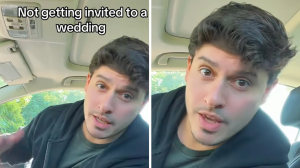Yes, David Beckham is really good at soccer.
Photo by Alex Livesey/Getty Images.
And, yes, he’s very easy on the eyes.
Photo by Justin Tallis/AFP/Getty Images.
But it’s Beckham’s generosity of spirit that really makes him shine.
For close to 11 years, Beckham has served as a UNICEF goodwill ambassador. In this role, he’s traveled around the globe to support and raise awareness for the world’s most vulnerable kids.
Fight for the protection of children around the globe @unicef
A photo posted by David Beckham (@davidbeckham) on
Beckham has met with children in Thailand, the Phillippines, South Africa, and more. At every stop, he uses his celebrity to raise awareness about the preventable dangers affecting young people around the globe, including malnutrition, AIDS, and Ebola.
On Jan. 12, 2016, Beckham received the Danny Kaye Humanitarian Leadership Award from UNICEF for his commitment to children worldwide.
Photo by Jonathan Leibson/Getty Images for U.S. Fund for UNICEF.
The honor, named for UNICEF’s first celebrity ambassador, Danny Kaye, is bestowed upon individuals who take an active role to save and improve the lives of children around the globe.
Beckham attended the star-studded UNICEF Biennial Ball in Beverly Hills and accepted his award from Sir Elton John and David Furnish.
But awards like this don’t signal the culmination of a life’s work. In fact, they often mean just the opposite.
Which is to say, Beckham’s done a lot — but he’s just getting started.
In 2015, Beckham launched 7: The David Beckham UNICEF Fund — the 7 being a reference to his jersey number.
A photo posted by David Beckham (@davidbeckham) on
The 7 fund differs slightly from Beckham’s work as a goodwill ambassador. Instead of visiting a single destination, Beckham traveled to seven different countries to take part in seven big initiatives including education, HIV/AIDS prevention, and clean water.
Long term, Beckham plans to serve as a fierce advocate for these children while encouraging others (especially his famous friends) to give give what they can to help meet these urgent needs.
And Beckham even found a way to incorporate his first love, soccer, into his charitable mission.
Beckham plays with survivors of Typhoon Haiyan in Leyte in 2014. His passion for soccer lead to his next big project with UNICEF and the 7 fund. Photo by Ted Aljibe/AFP/Getty Images.
Beckham committed himself to playing seven soccer matches on all seven continents in 10 days.
Instead of the the well-appointed, sold-out stadiums he was accustomed to, he traveled to rugged and remote locations where UNICEF serves, like a small village in the highlands of Papua New Guinea and a refugee camp in Djibouti.
And yes, the star and his crew even made their way to Antarctica.
A photo posted by David Beckham (@davidbeckham) on
The Herculean effort was filmed for the BBC documentary “For the Love of the Game,” which is streaming now in the U.K.
So next time you run into David Beckham, remember this:
Photo by Adrian Dennis/AFP/Getty Images.
- Try not to faint.
- Give him a high five (or long sensual hug) to thank him for all the good work he’s done for kids around the globe.
Because you don’t need a cape, or even an international modeling contract, to be a hero, just a kind heart. (Though the latter certainly doesn’t hurt.)


































